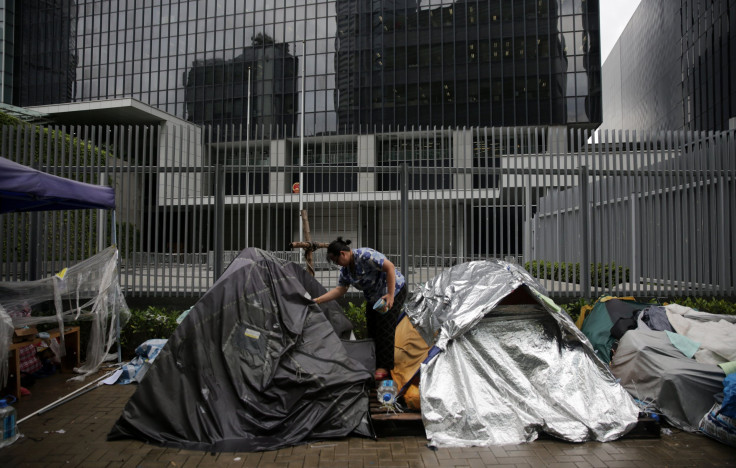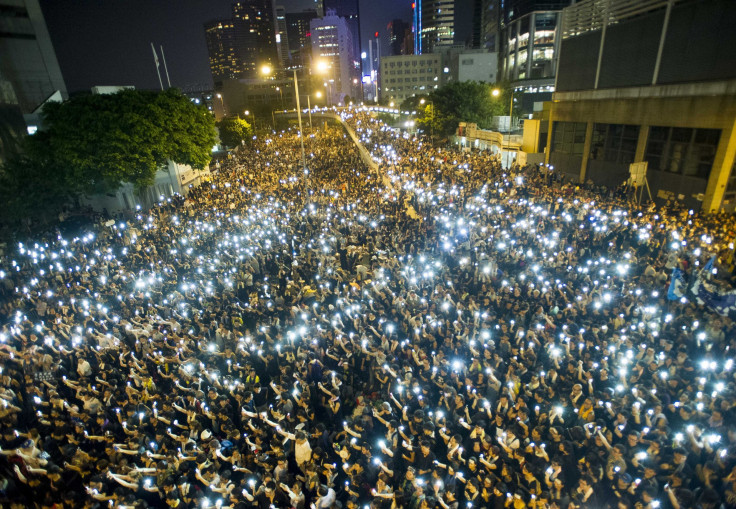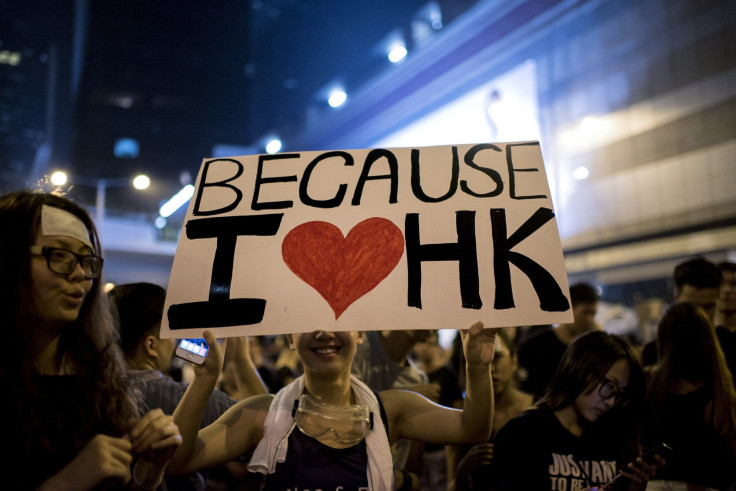Hong Kong Pro-Democracy Movement Faces Uncertain Future, Few Ways To Push For Change

HONG KONG – The thousands of protesters gathered outside the city's Legislative Council (LegCo) building erupted into cheers and singing when lawmakers here voted to reject a Beijing-backed political reform bill late last month. As the echoes of that celebration fade, however, the pro-democracy movement that captured the world's attention last year is facing an uncertain future, with few viable avenues open to it to press for reform, and an actively hostile partner in China's Communist Party government.
The city's pan-democratic bloc of legislators and pro-democracy civil society groups made defeating the bill a priority. The so-called reform bill would have seen the city's next chief executive elected by a vote with universal suffrage, but with candidates politically vetted by a pro-Beijing committee.
The bill's defeat, however, has come with political costs for the pan-democrats. China views the bill's demise as a significant loss of face. As a result, it has emphatically reaffirmed its position that it is unwilling to alter its opposition to democratic reform in Hong Kong.
Pan-democratic politicians in the city, while pledging to keep fighting for democracy, seemed resigned to the fact that concessions from Beijing, and therefore progress towards greater democracy, appeared to be highly unlikely in foreseeable future.
“I think it is not easy in the short run, because [China's Communist Party government] have just been slapped in the face,” Lee Cheuk-yan, chairman of Hong Kong's Labor party, told International Business Times this week, referring to the demise of the political reform bill. “To immediately turn around and try to reopen the political reform process I think will not be easy,” he added.
Lee's pan-democratic colleague, Emily Lau, chairman of Hong Kong's Democratic party, concurred, telling IBTimes: “It's not as if we can just start a consultation process [on democratic reform] by ourselves. Beijing has to agree. I guess we are stuck with [the current system]. It is very, very tragic, but that's the way it is.”
In addition to having few ways to go on the offense in their fight for democracy in the city, pan-democratic politicians, are likely to have to spend much of the next year trying to defend their most important political asset – the 28 seats the bloc controls and which enable them to veto the government's legislation.
The Chinese government warned pan-democrats that there would be “consequences” if they rejected the political reform bill, and with elections for Legislative Council (LegCo) seats set for September 2016, Beijing and its well-resourced allies in the city will be expending maximum efforts to unseat members of the bloc.
Beijing also hopes that by pushing its political allies in the city to focus on more prosaic issues, they can further reduce the impetus of the pro-democracy movement in the city, by forcing its chief advocates to concentrate elsewhere.
“I think that will be the strategy that they will use, especially during the elections,” Professor Ma Ngok, a political analyst and lecturer at the Chinese University of Hong Kong, told IBTimes. “[They will] force the people to focus on other issues, to kill off hopes for universal suffrage.”
For the student groups who took Hong Kong's fight for democracy to the streets in last year's Umbrella movement, options to effect real political change seem fewer still.

The street protests of last year failed to secure even meager concessions from the authorities, as did direct negotiations between student leaders and the Hong Kong government. In recent months, pro-democracy demonstrations have attracted noticeably fewer attendees. There were just a few thousand gathering outside the LegCo complex for a few days in the runup to the vote on the reform bill, and the turnout at this year's annual July 1 pro-democracy march was the lowest since 2008.
Internecine strife has also gripped the city's student activist groups, with several student groups voting to leave the umbrella group, the Hong Kong Federation of Students. Further, for the first time activists held separate protests to mark the 1989 Tiananmen Square massacre.
As a result, there is no unified strategy on how civil society groups should proceed. Joshua Wong, the 18-year-old convener of student activist group Scholarism, who became the face of the Umbrella movement protests in the city last year, told IBTimes that his group would not return to street protests and instead will focus on consolidating its support.
“We don't have plans to occupy again, but I think it is really important for us to use more propaganda and promotion. The Occupy movement last year generated a lot of interest in politics among secondary school students, so we will gather that into organizations to increase the bargaining power of students,” he said.
Senior members of other Hong Kong student groups told IBTimes that they planned to host on-campus debates and symposia on the future of Hong Kong democracy, with the hope that the discussion will percolate out into wider society.

Outside of discussion, the one concrete proposal being advanced by some civil society groups is to amend the Basic Law, the mini-constitution that governs the territory. With China remaining firm that no new proposals on political reform will be entertained, such a goal seems unlikely to be achieved.
The dwindling options for democracy advocates to affect change and the reduced number of people in street demonstrations could reflect a disenchantment with establishment politics and lead to more radical action, one student leader warned.
“I think that if there are more people who feel that [demonstrations] are useless, they will use a more radical way to achieve [their goals],” Coleman Lee, external vice president for the Hong Kong University Student's Union, told IBTimes.
“I think this is a time bomb in society. I think that if the government pushes more controversial policies that this bomb will explode. Next time, the scale [of public reaction] may be much more radical than Occupy last year,” he added.
© Copyright IBTimes 2024. All rights reserved.












